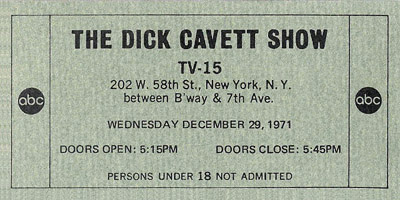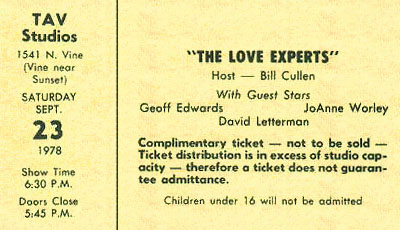Dick Cavett Show, The (1969-1974)

There have been quite a few programs called The Dick Cavett Show but with the exception of one ill-fated attempt at variety, they were all pretty much the same: Cavett sitting around, talking to interesting people. Cavett had previously worked as a writer for both Jack Paar and Johnny Carson, and he seemed to have absorbed the better qualities of each without the worst. He had Paar’s love of conversation but not the same penchant for feuds and self-pity, and he had Carson’s comic instincts without the occasional leering qualities. On the downside, he sometimes had an “I’m smarter than you” attitude that alienated some viewers and there was often the subtext of, “Look at all the famous people I hang out with.” Neither was fatal and on the whole, Mr. Cavett did a very fine show.
It’s unfortunately lumped in with the long list of talk shows that tried to compete with Johnny and failed, and some of the articles about Cavett make it sound like he was in and out of the time slot in thirteen weeks or less. He was actually on for almost five years which, given how highly competitive it was to be on then at 11:30, is quite an accomplishment. The show was also critically-acclaimed and won awards at a time when that could be said of very little on ABC.
In 1973, ABC was enjoying some ratings success in prime-time and the execs there became infatuated with the idea that they could also win in late night. They began monkeying with the 11:30 slot, moving Cavett into a rotating format that performed worse than what it replaced. The other main component of this round-robin was Jack Paar Tonite, which failed and took Cavett’s show with it, which was our loss. Cavett went on to other, similar shows in other venues.
The above ticket says the show was done from something called TV-15. It was one of those theaters in New York that changed names and functions from year to year. It started life as the John Golden Theater in 1926 and was the Elysee the last time it housed plays. Dozens of different TV shows (including one of Merv Griffin’s) were done there in the fifties and sixties. Not long after Cavett vacated, it was turned into a church (which it had been occasionally before) and it was finally demolished in 1985.
Love Experts, The

Another in the endless series of game shows hosted by Bill Cullen, The Love Experts was an awkward attempt to combine a game show with a talk/advice show. In each episode, three contestants would appear — one after the other — to talk about their romantic problems and to seek advice from that day’s panel of four celebrities. The expertise was a little dicey. Even assuming you’d want to talk about your love life on national TV, would you want counsel from Joanne Worley? Soupy Sales? Elaine Joyce? Nipsey Russell? Peter Lawford? At least some of those people should have been seeking advice instead of giving it.
As you can see from the above ticket, even David Letterman was one of the alleged experts. This was from a brief period when Mr. Letterman was making the rounds of game shows, usually acting like he didn’t want to be there, wherever he was. I suspect his advice to the lovelorn, even if he didn’t express it on the air, was to not seek advice from people like himself.
Producer Bob Stewart had previously taped and been unable to sell a pilot of this show hosted by Jack Cassidy…and hey, there’s a guy who didn’t have a single problem in his love life. When Cullen was brought in, he was doing double-shifts, simultaneously hosting The $25,000 Pyramid, also produced by Stewart. Bill did his best to keep the proceedings moving, and the show actually lasted a whole year in syndication (September of ’78 through September of ’79) though it didn’t air in many of the major markets. The “game” part came at the end when the celebs would vote to award a big prize to the person who had the most interesting story, which generally meant the most pathetic one. My main recollection of the program is that the romantic problems that the contestants offered up sounded phony and contrived. If they weren’t fabricated by the show’s producers, they were probably phonied up by the contestants hoping to win the big prize.






